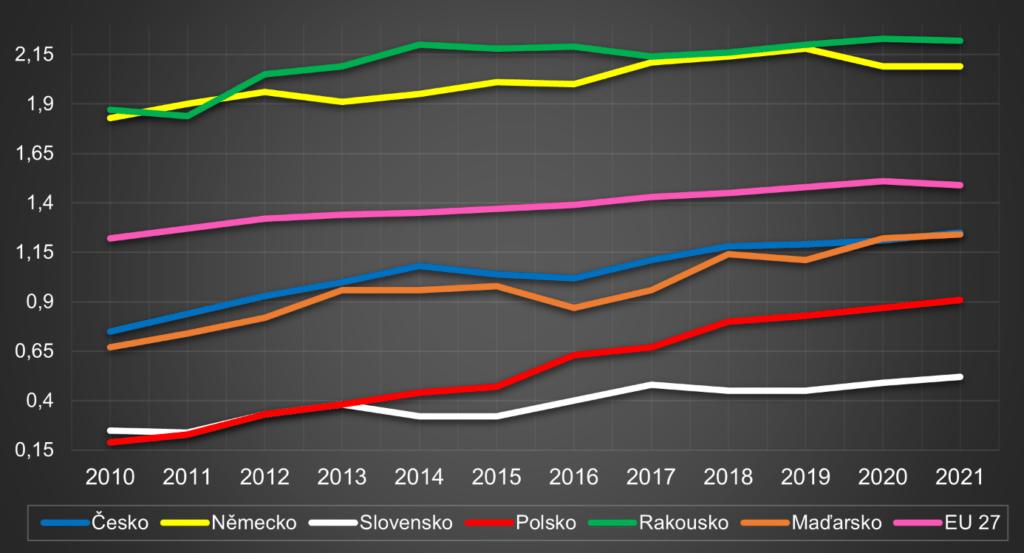The Czech Republic stands at a pivotal moment in its contemporary history. The nation has depleted its former growth drivers, forfeited its competitive edge, and now finds itself ensnared in the so-called middle-income trap – a phenomenon that can ensnare countries striving to catch up with economically developed counterparts.
The outcome of this predicament forebodes prolonged economic stagnation, a deceleration in wage growth, and a slump in living standards. These conclusions stem from an analysis of the Czech economy’s competitiveness, conducted by the Chamber of Commerce.
The Czech Republic’s advancement has largely been underpinned by its embrace of foreign investments and utilization of labor-intensive production technologies. However, empirical evidence suggests that most of the Czech economy’s convergence with the EU average transpired prior to 2008 or 2009 when the global financial crisis wreaked havoc on the domestic economy. Subsequent to this period, the pace of convergence with the EU average significantly decelerated.
By 2009, the Czech economy had narrowed the gap to the EU average by 14 percentage points, but post that year, progress was a mere 4 percentage points. In contrast, Poland has surged 20 percentage points closer to the EU average since 2009. If current trends persist, Poland could potentially surpass the Czech Republic in economic terms in the foreseeable future.
According to the Chamber of Commerce’s assessment, further alignment with more developed nations, not solely in terms of wages, will be a formidable challenge with the prevailing economic structure. Zdeněk Zajíček, President of the Chamber of Commerce, emphasizes that for the economy to continue converging and attaining Western countries’ standards, it must break free from the middle-income trap, transitioning toward higher value-added production. Such a transition would enable sustained competitiveness despite relatively higher labor costs.
However, the Czech economy faces a conundrum as it generates predominantly low added value. In international comparisons, its value-added creation is among the lowest in the European Union, with the Czech Republic ranking 24th out of 27 countries. Regrettably, the domestic economy has yet to effectively extricate itself from the middle-income trap and ascend to higher value-added production.
The shift to higher value-added production necessitates robust investment and innovation activities from both the government and private sector.
“The state certainly has a pivotal role to play in reversing this trend. It is incumbent upon the state to establish conducive conditions that nurture corporate growth, rather than impede it. Strategic investments in energy, transportation, information, and other infrastructures, coupled with investments in science, research, and education, are pivotal. The state should also incentivize corporate innovation, possibly by creating an attractive and predictable business environment devoid of protracted authorization procedures, superfluous regulations, and bureaucracy,” adds Zajíček.
Remarkably, the Czech Republic surpasses neighboring Germany and Austria in terms of corporate investment in research. However, despite Czech companies’ research and development expenditure as a percentage of GDP reaching its highest point (1.25% of GDP) in 2021, it still trails the EU average of nearly 1.5% of GDP.
Poland provides an illustrative case of augmented business investment expenditure. In 2010, Polish firms allocated the least amount toward research among the Visegrad Four countries (0.19% of GDP). However, subsequent years witnessed a significant increase in research and development investment (0.91% of GDP in 2021), potentially contributing to Poland’s recent upswing in labor productivity and GDP per capita.
The Czech economy’s stagnation, dwindling development momentum, and eroded competitiveness are also underscored when compared to the United States – a pinnacle of Western economic development. In 2021, based on OECD data, labor productivity in the US, evaluated using purchasing power parity, was equivalent to $75. In contrast, the Czech Republic’s labor productivity, measured by GDP per hour worked, was $43, marking a disparity of over 40%.
State of public finances and total public debt significantly impact corporate investment endeavors.
“The escalating trajectory of our country’s debt demands our attention. The trajectory of public finances inherently influences business expectations and investment decisions. Notably, a state endeavoring to consolidate public finances encounters challenges in allocating budgetary resources for investments and innovation. Conversely, significant strategic investments are indispensable for our country. Hence, the state must amplify investment activities and reallocate funds from the existing budget. Both public and private investments will influence our nation’s competitiveness and contribute to economic growth, thereby bolstering the state’s capacity to meet obligatory expenditures and service public debt in the future,” concludes Zajíček.
The Chamber of Commerce, along with the Confederation of Industry and Transport and the Confederation of Employers’ and Entrepreneurs’ Associations, underscored the Czech Republic’s entrapment in the middle-income conundrum during a SWOT analysis discussed by the Government Committee for Strategic Investments in its inaugural meeting in July. The analysis highlights the subpar level of gross value added per employee, particularly within the industry, amounting to 40% of the German equivalent.
On September 1st, business organizations will host the “The Czech Republic at the Crossroads – Vision and Strategy for the Next 30 Years” conference at Prague’s O2 universum Congress Hall. CEOs of domestic companies from across the nation will engage in discussions with Prime Minister Petr Fiala regarding a strategy to overcome existing threats and maximize opportunities for the country’s future.
Source: komora.cz


















